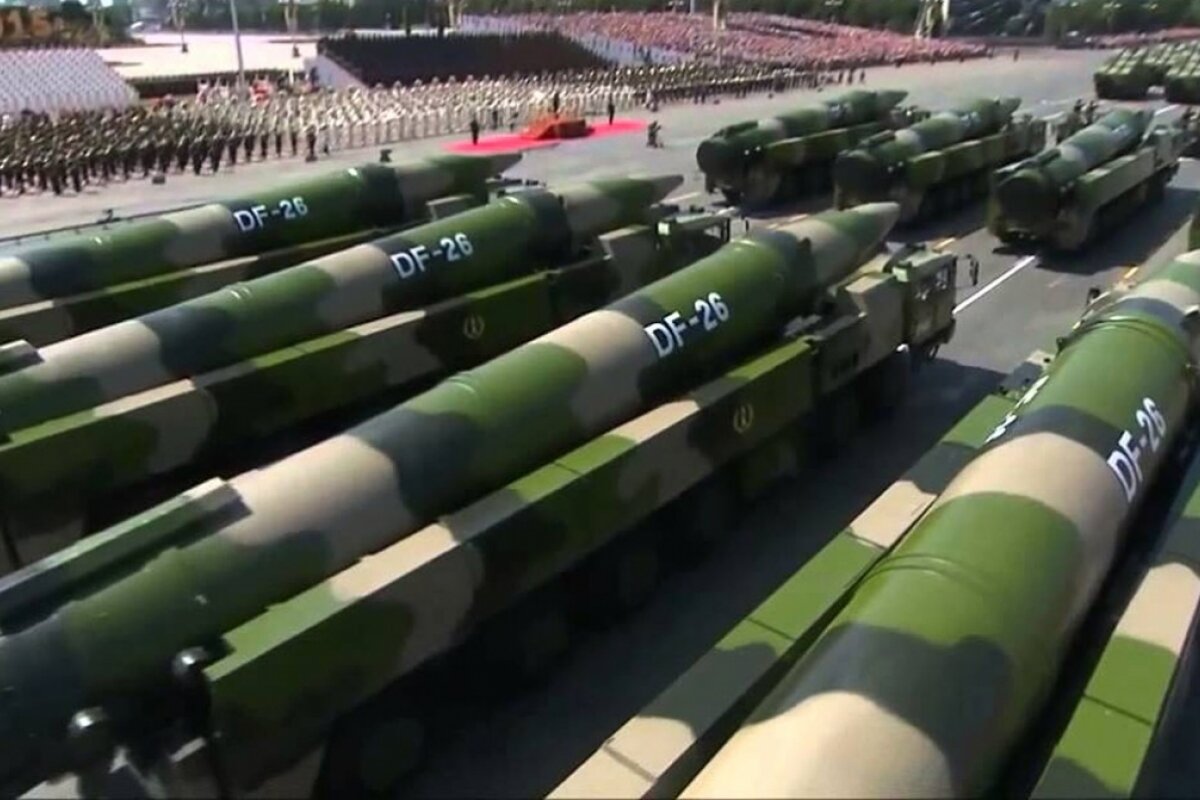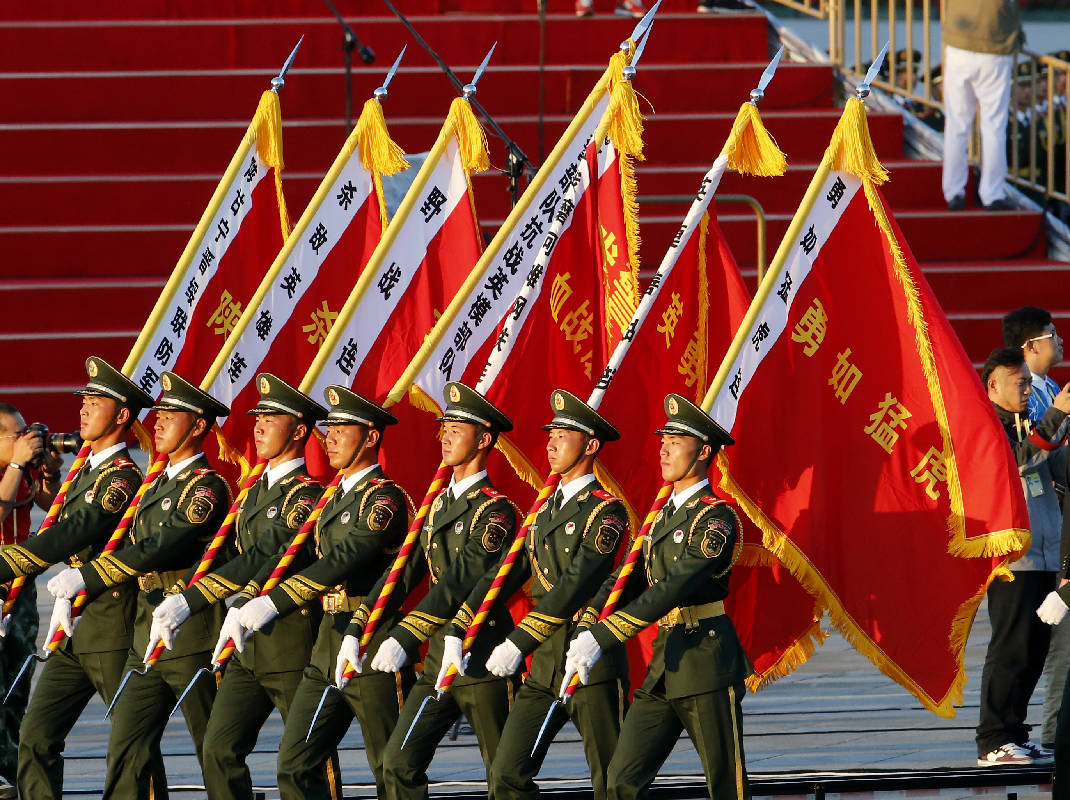To be sure, foreign criticism does whip up Chinese patriotism and nationalism as it can elsewhere, but for Beijing, these criticisms cut to the core of the Chinese Communist Party’s innate vulnerabilities.
The Next National Security Strategy: A Way Forward to Counter a Resurgent China
Despite the multitude of domestic issues facing the United States as it approaches a presidential election, policymakers must also not lose sight of enduring foreign threats to the nation. Members of both political parties generally agree China constitutes the preeminent national security concern. How should the United States, in a post-COVID world, check Chinese global influence to best protect American national interests?
Countering China’s Counter-Intervention Strategy
China’s counter-intervention capability presents a tremendous impediment to continuous U.S. military operations within the Indo-Pacific. Its South China Sea claims, underpinned by weapons development and efforts across the non-military elements of national power, are intended to ensure China’s freedom of action. A free and open Indo-Pacific relies on further development and deployment of U.S. integrated air and missile defense systems and offers the means for hindering China’s counter-intervention strategy. These recommendations provide a realistic approach to compete with China in multiple domains and to ensure access in the event of a regional crisis.
What Comes After COVID-19? Political Psychology, Strategic Outcomes, and Options for the Asia-Pacific “Quad-Plus"
The novel coronavirus pandemic has built the foundation for an unexpected pax epidemica between the U.S. and China. The pandemic has inflicted significant damages on all the great and middle powers to the extent that none would be in a position to win a war anytime in the near future. Most importantly, policymakers’ pessimistic considerations about their own country’s military capabilities and readiness for war would make them risk-averse and unwilling to undertake any major military campaign, therefore calling off the risk of interstate war altogether.
Don’t Bring a Knife to a Gunfight with China
Given China’s existing strategy, military thought, and fears of rebellion, renewed state support for insurgents is far from certain. Instead, China is more likely to employ economic and informational tools to achieve its aims, while focusing on partnerships with state actors and striving to remain below the threshold of armed conflict. While this does not mean we can afford to disregard counterinsurgency entirely, as China is not our only competitor and could always adopt new stratagems, it does suggest a different set of defense priorities for countering China.
Strategic Failure: America is (Literally) Missing the Boat Competing with China
As the name suggests, great power competition—the newest focus of the U.S. Department of Defense—is about power. However, despite the recent fetishization of great power competition within the defense community, few people give serious thought to what power is and how great powers wield it to compete. In today’s great power competition with the People’s Republic of China, American strategists appear stuck focusing on archaic instruments of power and power projection to the detriment of national security. The Department of Defense spends billions on military hardware while rhetoric and neglect undermine the political partnerships and economic integration on which American power is based. Strategists pay lip service to strengthening alliances, then trumpet a foreign policy of “America first.” They highlight creating new partnerships, but fail to consider the economic and financial tools that establish genuine interdependence and influence. China is using a variety of initiatives to make advances across the globe while the United States is missing the boat.
The Rhymes of History: Beijing’s Nightmare Strategic Scenarios
Perhaps the most challenging consequence of a non-repetitive history is that the future is mostly undetermined, a mystery revealed only by the unfolding of particular events. This uncertainty puts the onus of decision and responsibility squarely on the shoulders of political, diplomatic, and military leadership, who must navigate this challenging terrain with incomplete knowledge of its features. A Sino-U.S. war is not preordained, nor is it an impossibility. If it ever does happen, it will be the result of the particular choices, words, and deeds of particular leaders, not a pattern embedded in the structure of history.
The Slow-Motion Crisis: Climate Change and its Effect on U.S.-China Competition
We live in an era of great geopolitical change. From the way groups compete to the diffusion of power among state and non-state actors, the upcoming geopolitical shifts will bear little resemblance to those of the past. Many people have studied how artificial intelligence, global markets, social media, and hypersonic weapons will affect the way states compete in the future. Another major factor in future geopolitical competition, especially between the reigning hegemonic power of the U.S. and rising regional ambition of China, will be climate change.
Not Another Peloponnesian War: Great Power Collaboration?
As Thucydides showed so clearly, the real trap is power itself. Insufficient power leaves one open to being exploited, or worse; more power actually makes power harder to control, and it leaves one vulnerable to being undermined. That is the nature of power. Thucydides was right about fear, honour, and interest being the motivators for power.
The U.S.-China Rivalry as Seen in the Cold War’s Rear-View Mirror
As the U.S.-China rivalry intensifies and tensions grow, references have increasingly been drawn between it and the other great geostrategic contest of the post-war era—the Cold War. While it might still be premature to speak of the current U.S.-Chinese rivalry and the half-century spanning Cold War in the same breath, it is not hard to see why the present situation is so evocative of its epoch-defining predecessor.
Don’t Say No One Warned You: #Reviewing China’s Vision of Victory
Xinjiang and the Belt and Road Initiative
Since Deng Xiaoping’s Reform and Opening-Up policies, China has modernised to a startling extent. However, this growth has been uneven and has caused severe inequality across the country. China’s Belt and Road Initiative (BRI) is often seen as promoting China’s influence across the world, but this is not its only purpose. This article looks at how the Belt and Road Initiative is being used as one measure to transform some of the poorest regions of China, and how despite this, China is failing to address some of the issues in its most volatile areas.
#Reviewing Red Star Over the Pacific
China seeks nothing less than to displace the United States as the preeminent power in the Pacific, if not the world. It intends to make a new order that expands the reach of its state-driven economic model. To achieve this vision, China's leaders have characterized the first two decades of the 21st century as a "period of strategic opportunity," during which Xi Jinping's “Chinese Dream” of national rejuvenation can be realized.
Not a “New Era”—Historical Memory and Continuities in U.S.-China Rivalry
The notion of a new era has become pervasive and nearly inescapable in both American and Chinese discourse, and the phrasing may, at first, appear entirely appropriate. After decades in which U.S. policy has been more oriented towards engagement, U.S. strategy today clearly and explicitly recognizes China as a competitor, seemingly undertaking a historic reorientation in ways that can be seen as reflecting a major discontinuity with the past. However, the typical turning to this phrasing of a new era to characterize recent trends in U.S.-China relations, while perhaps rhetorically appropriate, can obscure what is not new, emphasizing novelty at the expense of recognizing the history and relative consistency in certain aspects of U.S.-China relations.
#Reviewing The Hundred-Year Marathon: Running on Flimsy Historical Grounds
The premise of Michael Pillsbury’s controversial book is alarming yet straightforward. Western strategic thinkers have been the victims of a massive deception campaign perpetrated by a group of Chinese hardliners who have convinced the West that China’s intentions are benign, but who are, in fact, driven by one overriding goal, to overthrow the U.S. as the world’s sole superpower. If this conjures up images of a thriller from the pen of Dan Brown, it may be the intent of the author.
Escaping the Idealism Trap
Idealism has clearly failed to grant the United States a stronger standing in the world as it failed to accurately assess the scope and consequences of interventionism, and the strategic intent of rising powers. Great power competition and the international system’s inevitable transition to a multi-polar order calls on us to embrace the challenge with clarity. This challenge should motivate an honest reassessment of U.S. foreign policy tools and processes. Adjusting to facts and reevaluating means and methods is a sign of strength and resilience of this nation.
Expanding the Intellectual Capital on Challenges: China
As an exporter of professional military education, the U.S. has institutionalized western classics and ideas across the profession of arms around the globe. However, not all of the foundational classics of other civilizations have made their way to the required reading list. A common understanding of a challenge requires an understanding of our own fundamental points of reference for doctrine and strategy and an understanding of others.
#Reviewing By More Than Providence
An appropriate grand strategy, one that has a regional focus on deterrence, trade, and values will go a long way towards the peaceful management of the balance of power in the Pacific. Green’s work is timely, and decision makers, practitioners, or students of grand strategy and statecraft would do well to add it to their reading list.
The End of Strategic Patience: The North Korea Dilemma
The continuum of applied U.S. strategies towards North Korea has failed and will never achieve the desired strategic objectives, as they are currently envisioned. This is because U.S. policymakers remain focused on denuclearization and non-proliferation vice regional stability as the strategic goal. In the 2015 U.S. National Security Strategy (NSS) President Obama outlined his vision for leveraging “strategic patience” as a means to force the Kim regime to the negotiating table. In his view, this strategy focused on a “commitment to the denuclearization of the Korean Peninsula.” However, because the U.S. continues to fundamentally miscalculate the underlying cultural influences guiding North Korean decision-makers and because China and Russia have failed to consistently enforce economic sanctions imposed by the UN Security Council (UNSC), strategic patience as envisioned by President Obama failed to produce the desired results. Continuing to march towards the same end-state, albeit more aggressively than before, President Trump released his 2017 NSS that asserts the U.S. “will work with allies and partners to achieve complete, verifiable, and irreversible denuclearization on the Korean Peninsula and preserve the non-proliferation regime in Northeast Asia.” Unfortunately, pursuing a denuclearized North Korea and convincing North Korea to agree to non-proliferation are fruitless endeavors. To understand precisely why these strategies have failed and will continue to fail, it is important to understand the cultural ideologies that influence North Korean national objectives and domestic policy actions.
Chinese State Sponsored Hacking: It’s Time To Reach an Effective and Lasting Bilateral Agreement on Cyberwarfare
It remains to be seen whether or not the current administration’s approach to China will bring further progress in terms of limiting cyber attacks. Ultimately, extending the terms of the 2015 agreement to explicitly ban attacks, to encourage co-operation in hardening financial institutions against them, and perhaps even mandate bi-lateral responses should they occur, would be in the mutual interest of both the U.S. and China.





















